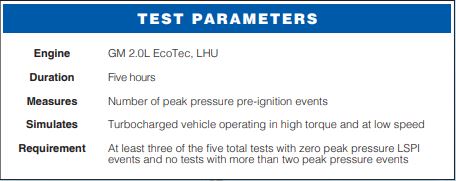SIGNATURE SERIES MOTOR OIL PROTECTS ENGINES FROM LOW-SPEED PRE-IGNITION
LSPI can destroy pistons and connecting rods, bringing an engine to a standstill in seconds. Original equipment manufacturers (OEMs) like General Motors (GM)* have addressed the issue by designing tests to gauge a motor oil’s ability to prevent these destructive events. Signature Series achieved 100 percent protection against LSPI1 in the industry-standard test.
OEMs have been aggressively downsizing engines to meet strict fueleconomy and emissions standards while improving power and torque. Most new engines today use some combination of turbochargers, direct-fuel injection and variable valve timing to make more power than their larger counterparts while delivering improved fuel economy.
This scenario seems like all upside for drivers. But today’s smaller, hotter-running engines pose significants challenges to lubricants. The latest is a phenomenon called low-speed pre-ignition (LSPI), also known as “super knock,” which can destroy pistons and connecting rods.
What Is LSPI?
LSPI is another version of engine knock, which has been around since engines were invented. In this case, it occurs under low-speed, high-torque conditions in turbocharged gasoline direct-injected engines – like when you’re taking off from a stoplight. LSPI is the spontaneous ignition of the fuel/air mixture prior to spark-triggered ignition. This form of preignition is more destructive than typical engine knock.
No Magic Bullet
Just as your engine relies on a balanced network of components to function, the motor oil needed to protect it requires additives with the right qualities at the right quantities. While adding more of one ingredient or reducing another seems simple enough, small composition changes can have big impacts. We were determined to find a solution to the LSPI problem without sacrificing the performance of Signature Series in any way.
GM LSPI Test
OEMs like GM have addressed the issue by designing tests to determine a motor oil’s ability to prevent LSPI. The GM LSPI Test records the number of peak pressure events during high-load operation in a turbocharged engine over a five-hour period. Passing the test is required to meet the GM dexos1® Gen 2 specification.
Perfect Score
We armed Signature Series with an advanced detergent system that protects against harmful deposits and LSPI. Signature Series Motor Oil achieved 100 percent protection against LSPI in the engine test required by the GM dexos1 Gen 2 specifications – zero occurrences were recorded throughout five consecutive tests.
API SN PLUS Specifications
API SN PLUS is a recently released specification that was requested by the automobile industry to protect passenger vehicles from LSPI. AMSOIL anticipated this change, and the current formulations of Signature Series, XL and OE synthetic motor oil all meet or exceed the specification. Look for updated product labels featuring the new API “donut” in the near future.
Your customers can be confident that AMSOIL synthetic motor oils protect their modern engines against LSPI, helping their vehicles deliver years of reliable service. For more information on the dangers of LSPI, visit www.amsoil.com/lspi.

Achieved 100% Protection Against LSPI1

